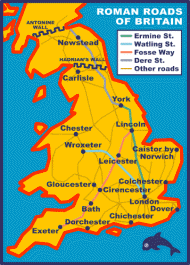


3C Class Assembly |
9 March 2007 |
   |
Meet Marcus and Flavia! |
||
Marcus is a Roman soldier stationed at Hadrian's Wall. The Roman army had defeated the Celts, but the Picts and the Scots were even more fierce and caused a lot of problems for the Romans. That is why Hadrian had a huge wall built from one side of the country to the other to keep them out. |
Flavia is a rich Roman lady. She and her husband have a large villa in the English countryside, with a bath-house, a courtyard, a herb-garden, mosaics on the floor and, of course, central heating! They are served by slaves who look after the family well. |
|
Did you know...? |
- |
The Romans used a form of central heating over 2000 years ago! It was called a hypocaust. Hot air from a furnace circulated under the floor and inside flues built into the walls, warming a room. |
All Roads Lead to Rome |
||
The Roman Empire had an excellent system of roads built by the army to allow soldiers to travel quickly in wartime. They also made it easier for merchants to carry their goods around the empire. Roman roads were usually long and very straight. In Britain, the main Roman roads were, Ermine Street, Watling Street and Fosse Way. |
 |
|
The Roman Road Map is taken from the Museum of Antiquities website. Click HERE to visit their fantastic, child-friendly section about Tribes and Romans in Northern Britain. |
||
| Please Note: Clicking the above links will open pages from the Museum of Antiquities website in a new window. We are not responsible for content hosted outside of the Forefield Junior School website. |
Did you know...? |
- |
You have most probably travelled along a Roman road. Many of our motorways and roads today are built over the original Roman roads. |
Doctor, Doctor! |
|
The Romans had useful remedies for a number of illnesses or complaints. |
|
Bitten by a spider? Crush the body of the spider on the wound, or cover the wound with a piece of its web. |
|
Feeling run down? Try a broth of shrimps, flour and frogs boiled in wine. |
|
Have a fever? You should eat the flesh of frogs cooked in olive oil. |
|
Please DON'T try these cures yourself! But, then again, who would want to? Yuck!! |
Have You Got The Time? |
|||||||||||
The Ancient Romans used a system of letters as numbers. We can still often see Roman Numerals today, especially on clock faces or on film credits to tell us what year it was made. |
|||||||||||
I |
II |
III |
IV |
V |
VI |
VII |
VIII |
IX |
X |
XI |
XII |
1 |
2 |
3 |
4 |
5 |
6 |
7 |
8 |
9 |
10 |
11 |
12 |
How would the Romans have written 13? |
What number would be XV in Roman Numerals? |
||||||||||
The Ancient Romans also gave us the names of our months. |
|||||||||||
January - after Janus, a god with two faces to look forward and backward |
May - after the Roman earth goddess, Maia |
||||||||||
February - from Februa, a Roman Festival |
June - from Junius, a popular girls name in Ancient Rome. |
||||||||||
March - after Mars, the Roman god of war |
July - after Julius Caeser |
||||||||||
April - thought to be taken from the Latin for 'opening', a time when flowers begin to blossom |
August - after the Emperor Augustus |
||||||||||
Did you know...? |
- |
The Ancient Roman Calendar originally only had 10 months in the year. The months of September, October, November and December are named after the Latin words for Seven, Eight, Nine and Ten! |
Roman Religion |
|
 |
The Romans worshipped many gods and goddesses. They even thought their Emperors were gods! When they conquered Britain, the Romans brought their religion with them. People who refused to believe in their gods were severely punished. Christians, Jews and Druids were persecuted the most. Eventually, after about 300 years, the Emperor Constantine allowed his citizens to follow Christianity. Roman Catholicism is still the largest Christian religion today. |